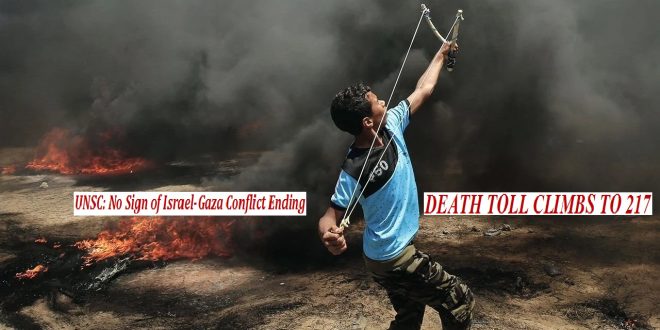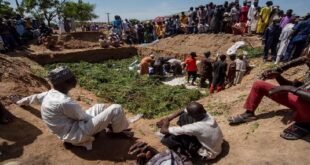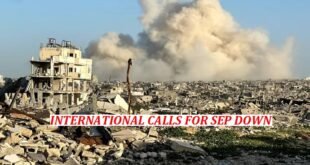19-05-2021
By SJA Jafri + Agencies
PARIS/ GAZA CITY: “The Israel-Gaza conflict is pushing the whole region “in the wrong direction,” Saudi Foreign Minister Faisal bin Farhan said Tuesday, calling for an end to the violence.
“This all pushes us absolutely in the wrong direction. It means that we are making a path toward a sustainable peace more difficult,” bin Farhan told media, as the international community steps up its diplomatic efforts to push for de-escalation.
The conflict is “empowering the extremists,” he added.
“It empowers the most intolerant voices in our region and makes (finding) a path to real peace harder,” he added, speaking on the sideline of summits in France on Sudan and Africa.
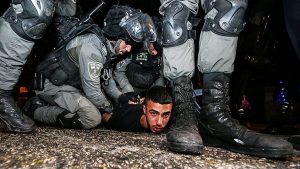 “We have to all work together to encourage all the parties to engage (seriously), he said, “first of all, to de-escalate, to stop the violence and then to engage in serious peace talks toward a final settlement.”
“We have to all work together to encourage all the parties to engage (seriously), he said, “first of all, to de-escalate, to stop the violence and then to engage in serious peace talks toward a final settlement.”
That final settlement “must include a Palestinian state with East Jerusalem as its capital,” Saudi Arabia´s top diplomat stressed.
Israel´s near-relentless bombing campaign has killed 217 Palestinians, including 63 children, and wounded more than 1,400 people in just over a week in the Hamas-run enclave, according to Gaza´s health ministry.
The death toll on the Israeli side rose to 12 when a volley of rockets Hamas fired at the southern Eshkol region killed two Thai nationals working in a factory and wounded several others, police said.
“Our key priority is to reinitiate peace talks between Palestinians and Israelis,” bin Farhan said.
“This is the only path to a sustainable peace.”
Saudi Arabia has no official relations with Israel.
Earlier, heavy airstrikes and rocket fire in the Israel-Gaza conflict claimed more lives on both sides Tuesday as tensions flared in Palestinian “day of anger” protests in Jerusalem and the West Bank.
Calls for a ceasefire intensified, but Prime Minister Benjamin Netanyahu vowed Israel would continue its onslaught on the coastal enclave “as long as necessary,” before a UN Security Council meeting broke up after less than an hour without issuing a statement.
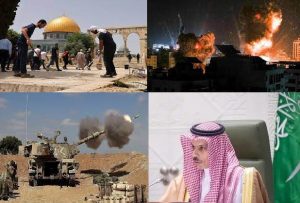 Israeli forces and protesters meanwhile clashed at multiple flashpoints across the occupied West Bank and in east Jerusalem, hospitalizing scores, as Palestinians rallied in solidarity with their besieged Gazan counterparts. Dozens were treated for wounds caused by live bullets, medics said.
Israeli forces and protesters meanwhile clashed at multiple flashpoints across the occupied West Bank and in east Jerusalem, hospitalizing scores, as Palestinians rallied in solidarity with their besieged Gazan counterparts. Dozens were treated for wounds caused by live bullets, medics said.
Israel´s near-relentless bombing campaign has killed 217 Palestinians, including 63 children, and wounded more than 1,400 people in just over a week in the Hamas-run enclave, according to Gaza´s health ministry.
The death toll on the Israeli side rose to 12 when a volley of rockets Hamas fired at the southern Eshkol region killed two Thai nationals working in a factory and wounded several others, police said.
Israeli strikes that again sent fireballs, debris and black smoke into the sky have left two million Palestinians in Gaza desperate for reprieve.
“They destroyed our house but I don´t know why they targeted us,” said Nazmi al-Dahdouh, 70, of Gaza City who remained shocked by what he called “a terrifying, violent night”.
The humanitarian crisis deepened in the impoverished strip, from where Hamas has launched nearly 3,500 rockets at Israel since May 10, often forcing people living near Gaza into bomb shelters around the clock but a convoy of international aid trucks that started rolling into Gaza through a border crossing from Israel, Kerem Shalom, was halted when Israel quickly shuttered it again, citing a mortar attack on the area.
Crisis diplomacy
Tuesday´s UN Security Council session, the fourth since the conflict escalated, was called after the United States, a key Israel ally, the previous day once again blocked adoption of a joint statement calling for a halt to the violence but the latest session again closed without consensus. “We do not judge that a public pronouncement right now will help de-escalate,” US envoy Linda Thomas-Greenfield said during Tuesday´s closed-door meeting, according to a diplomat.
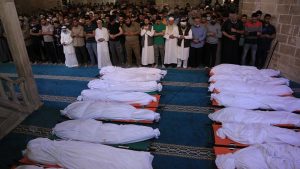 France and Egypt are pushing for a ceasefire deal, while Qatar and Egypt are working another channel, via the UN.
France and Egypt are pushing for a ceasefire deal, while Qatar and Egypt are working another channel, via the UN.
EU foreign policy Chief Josep Borrell on Tuesday strongly backed the manifold calls for a ceasefire, while urging Israel´s military to act in a “proportionate” manner.
The conflict risks precipitating a humanitarian disaster, with the UN saying 58,000 Palestinians have been displaced and 2,500 have lost their homes.
Fighter jets have hit Hamas´s underground tunnels, which Israel has previously acknowledged run in part through civilian areas.
A strike Monday knocked out Gaza´s only Covid-19 testing laboratory, the health ministry said, and the Qatari Red Crescent said a strike damaged one of its offices.
Hospitals in the territory, which has been under Israeli blockade for almost 15 years, have been overwhelmed by patients and there are frequent power blackouts.
Speaking at an air force base in Israel´s south, Netanyahu said Hamas and Islamic Jihad had “received blows they didn´t expect.”
“We´ve taken them many years back,” the premier said. “We´ll continue as long as necessary to bring… quiet back to the citizens of Israel.”
´Day of anger´
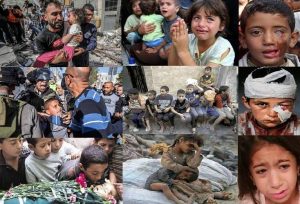 Palestinians across the West Bank and in Israeli-annexed east Jerusalem mobilised Tuesday for protests and a general strike that shuttered non-essential businesses, in support of those under bombardment in Gaza.
Palestinians across the West Bank and in Israeli-annexed east Jerusalem mobilised Tuesday for protests and a general strike that shuttered non-essential businesses, in support of those under bombardment in Gaza.
Palestinian president Mahmud Abbas´s Fatah movement had called for a “day of anger”, a call echoed in Arab and ethnically mixed towns inside Israel.
“We are here to raise our voice and stand with the people in Gaza who are being bombed,” Ramallah protester Aya Dabour told media.
In Jerusalem, Ala Judeh, 24, said he was on strike from his job as a gas station attendant in a Jewish neighbourhood in west Jerusalem.
Thanks to this strike, “we are starting to feel we are not just their slaves,” said the Palestinian resident of the occupied east of the city.
Israel´s army said troops came under fire north of Ramallah. It said two soldiers suffered leg injuries and were taken to hospital.
The Palestinian health ministry said four Palestinians were shot dead in the West Bank, bringing to 24 the total number of Palestinians killed there since May 10.
The Israeli army said one had attempted to attack soldiers in Hebron.
The Palestinian Red Crescent said its teams had treated more than 150 people in Jerusalem and the occupied West Bank, including 35 with live bullet wounds and more than 80 suffering from tear gas inhalation.
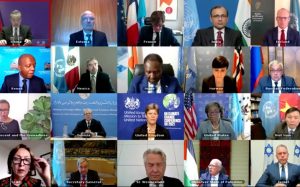 Before in the day, an assailant who attempted to attack soldiers in the West Bank city of Hebron was shot dead.
Before in the day, an assailant who attempted to attack soldiers in the West Bank city of Hebron was shot dead.
Tensions again flared in east Jerusalem´s flashpoint Sheikh Jarrah neighbourhood, where Palestinian protesters faced off against police, who used stun grenades and “skunk water” cannon to disperse protesters.
The Israel-Gaza conflict was sparked after clashes broke out at east Jerusalem´s flashpoint Al-Aqsa mosque compound — one of Islam´s holiest sites.
This followed a crackdown against protests over planned evictions of Palestinians in Sheikh Jarrah.
Meanwhile, a U.N. Security Council meeting made no progress on resolving the conflict, and Israeli warplanes began attacking Gaza again as the conflict moved into its second week.
Speaking on CBS’ Face The Nation on Sunday, Prime Minister Benjamin Netanyahu of Israel said there was no clear end in sight to the violence between Israel and Palestinians in the Gaza Strip.
“We’ll do whatever it takes to restore order and quiet,” he said, adding, “It will take some time.”
Hours after he spoke, Israeli warplanes began another round of attacks in the Gaza Strip, attacking a main road, security compounds and an electricity line feeding southern Gaza City, according to The Associated Press and local media reports. The attack was heavier, and lasted longer, than the air raids from the day before, the reports noted.
Netanyahu defended his nation’s bombing and shelling of Gaza, which Palestinian authorities say has killed at least 197 people, including 58 children. At least 10 people in Israel have died in rocket attacks fired from Gaza, the territory controlled by the militant group Hamas.
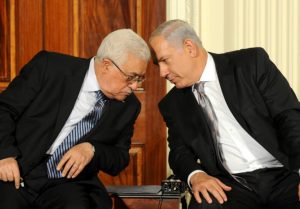 Representatives of the United States, Qatar, Egypt and others have tried to broker a cease-fire, so far to no avail.
Representatives of the United States, Qatar, Egypt and others have tried to broker a cease-fire, so far to no avail.
“If there will be one it will be reached with our conditions, not Israeli conditions,” Moussa Abu Marzouk, deputy leader of Hamas, told the Israeli public broadcaster Kan on Sunday. “If Israel does not want to stop, we will not stop.”
The general in charge of Israel’s Southern Command, Eliezer Toledano, told Kan, “it is important we continue to exhaust the campaign that we have entered and deepen the damage being caused to Hamas.”
The Israel Defense Forces, in a statement on Monday morning, said that it continued to hit targets in Gaza, including nine residences belonging to high-ranking commanders in Hamas. Some of that residence, the statement said, were used to store weapons.
Israel has faced wide condemnation from international press organizations for blowing up a building on Saturday that housed the offices of international media organizations including The Associated Press and Al Jazeera. Israeli forces warned in advance of the attack, and there were no casualties reported.
Israeli officials claimed that the building harbored military assets for Hamas. Speaking on Sunday, Netanyahu provided no clear evidence to support that claim, and also did not confirm whether he presented any evidence of this assertion during a conversation with Biden.
“It’s a perfectly legitimate target,” he said, adding that Israeli forces “unlike Hamas, take special precautions to tell people ‘Leave the building, leave the premises.’”
On the killings of Palestinian children, Netanyahu pointed the blame at Hamas, saying the organization uses civilians as human shields.
“We are targeting a terrorist organization that is targeting our civilians and hiding behind their civilians, using them as human shields,” he said. “We’re doing everything we can to hit the terrorists themselves, their rockets, their rocket caches and their arms, but we’re not just going to let them get away with it.”
He said Israel does everything it can to avoid civilian casualties. “They’re sending thousands of rockets on our cities with the specific purpose of murdering our civilians from these places,” he said. “What would you do?” (Int’l News Desk)
 Pressmediaofindia
Pressmediaofindia
